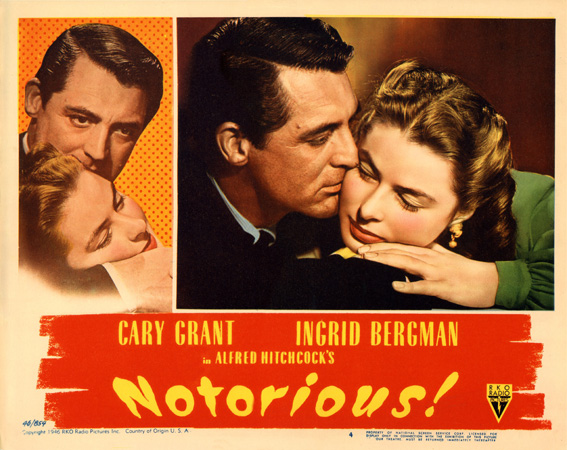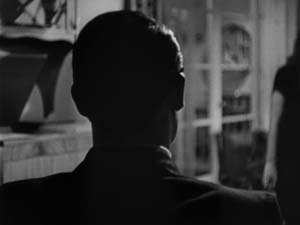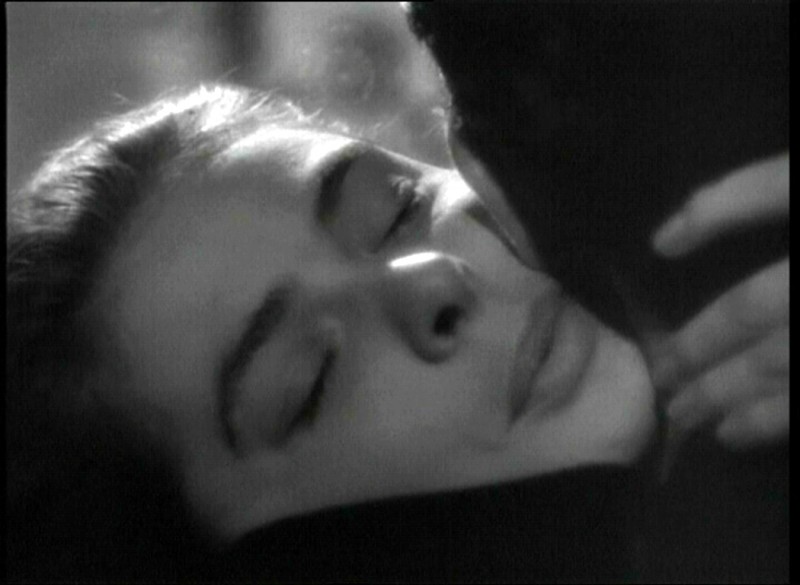I don't know what you call them really, fan videos, I suppose, that youtube sub-genre of people editing clips from favourite films to music or giving favourite songs a new video. Most of them are uploaded just to show the person loves this film/song, which is fair enough, but some are genuine attempts to create something fresh, to capture the essence of the story or lyrics.
Here are two of my favourites; the first from RubyTuesday717 who has managed to find music capable of doing justice to what is, arguably, the most profoundly heartbreaking film ever made, Eternal Sunshine of the Spotless Mind.
And this from Captainmcglue, finding metaphorical riches in the lush romanticism of Richard Hawley's Open Up Your Door. Enjoy!
Friday, November 27, 2009
Tuesday, November 3, 2009
Ten thoughts inspired by: Notorious

1. First of all, there's the symbiotic dance between directors and actors. Many of the best directors, those interested in psychological states, often struggle if they haven't got the right actors. Look at how often Hitchcock's lesser films are saddled with actors ill-suited to the roles, actors with no depth to begin with or whose guarded personas don't allow him anything to mine. (Think of Paul Newman in Torn Curtain). Look at how his well-known yen for beautiful actresses is matched in every respect by actors who brought the best out of him, Cary Grant and James Stewart mainly, but also Joseph Cotten,(Shadow of a Doubt) Robert Walker,(Strangers on a Train) and Barry Foster (Frenzy) to name just a few.
2. Look at how Hitchcock brings out things in these actors no-one else did, but equally, look at the riches flowing the other way too. He needed them, these conduits into transgressive areas. When he was lucky enough to get them he was brilliant at finding their hidden dark sides, all that alienation, misanthropy and self-hatred not far from the surface of charming exteriors (Cotten, Walker & Foster), how easily Stewart's pious do-goodery, his martyr's passion for justice could tip over into obsessiveness and destruction.

3. In Notorious he strips away Grant's easy charm, strips away 'Cary Grant' really, leaving this sauve husk, this dangerous void, (think of the first time we see Devlin in the film, just the back of his head, ominously watching the other party revellers). As an Englishman Hitchcock would have been more aware than most of the constructed nature of Grant's Hollywood persona, of the real Cockney hiding behind it, the slum-dog acrobat Archibald Leach. Surely the day he met Grant was the day he began to be fascinated by what's hidden behind charming exteriors?

4. Hitchcock's relationship with his screen women is no less fascinating and collaborative. Sure it graduated towards sadism in his later years but in the 40s it was romantic, an exploration of emotional complexity and a product of the natures of the actresses he worked with, mainly Ingrid Bergman.

5. No actress gave herself up to suffering like Bergman. Vulnerability, defiance, self-hatred, sadness, bravery, watch her take on all of these and more in Notorious, from drunken floozy to endangered heroine, beautiful all the way. You can sense Hitchcock's spellbound fascination with her, not just visually, but emotionally too, the way she's leading the film into places it might not have gone without her. Imagine what kind of film it would've been with a different actress, Rita Hayworth, say, or Jean Arthur?

6. Then there are those poor forgotten puppies of the movie business, the writers. Consider that Notorious was written by Ben Hecht, probably the geatest screenwriter of the golden age of Hollywood. He seems to have brought a new seriousness to Hitchcock, a grown-up respect for emotional terrain, for the classical marriage of form and content. You feel that everyone's on their game because Hecht has given them something better than usual. You also feel that part of what makes Notorious work so well are the details. Hitchcock was frequently sloppy when it came to details, openly deriding the plot devices (the famous McGuffins) at the centre of his movies. You sense that Hecht, that good newspaper man at heart, researched his locations and made sure the McGuffin here, uranium hidden in wine bottles, had a hint of truth to it (a year before the first atomic bomb was detonated.)
7. And don't forget the sly pleasures of Claude Rains. He's every bit as complex a character as the leads. With a little tweaking it could easily be his film, poor man, trapped by evil Nazi cronies who'll kill him at the slightest hint of betrayal, in love with a woman who turns out to be a spy and in thrall to a vicious, manipulative mother, forced to be a Nazi when all he really wants to be is a playboy, as charming and witty as Claude Rains.

8. And then there's patriotism, the last refuge of the scoundral. Devlin is seemingly willing to let the woman he loves whore herself for a greater cause, for the greater good. Is he right or wrong to do this? If this was post 9/11 rather than post WW11 would it look any better? And is it really patriotism or something else entirely, a desire to punish her for all those men she's slept with before him. Notice the cold way he looks at her sometimes. She's making him weak and he hates her for it, complicating everything, the simple certainties of good and evil, of allegience to job and country, of knowing who the enemies are. He looks at her and all certainty disappears. Only love can do this. It's superbly complicated, the kind of love rarely seen in Hollywood movies, then or now.

9. But it is love, and despite all its noir darkness this is a very romantic film. So let's not forget the famous, Hay's Code defying, extended kiss, a genius scene capturing the true carnal pleasure of lovers, all nuzzling little kisses and the addiction of closeness.
10. And finally, there's the truth of the camera, Hitchcock's eternal belief in movement for its own sake, for the pleasure of it, yes, but also for the way it could illustrate thoughts, feelings and situations better than anything Ben Hecht or anyone else could conjure up in words. So see it give you set-up and secret in one elegant swoop from staircase longshot to key-in-hand close-up or watch it thrillingly capture the heart-in-mouth shock of discovering your husband and his mother have been poisoning you by zooming into their smug, conniving faces.
Subscribe to:
Posts (Atom)